View all Standards for Florida Sunshine State Standards
TH.68.H.3.1 Identify principles and techniques that are shared between the arts and other content areas.
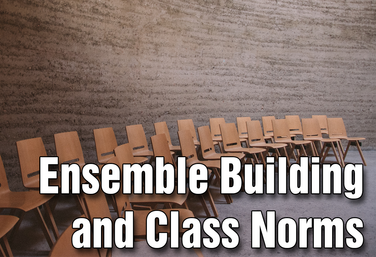
UNIT
Part of the Middle School Curriculum
Unit One: Ensemble Building and Class Norms
by Lindsay Johnson
This unit has six lessons that you can use in the first week of your middle school program. What do you do in the first week? The most important elements are creating routines such as journal prompts, opening and closing circles, and giving strong feedback; creating an ensemble and ensemble-building games; and introducing a Weekly Ensemble Rubric.
Students will define and build ensemble as a group, learning specific ways they can SAY YES and BE SAFE in class. They will understand the daily grading system and the basic routines of class. Finally, students will learn to give strong feedback by connecting specific evidence from performance to the Rubric language.
Read More
about Unit One: Ensemble Building and Class Norms
Read Less
about Unit One: Ensemble Building and Class Norms

UNIT
Part of the Middle School Curriculum
Unit Eight: Theatre of the Oppressed
by Lindsay Johnson
Students will have a chance to merge their understanding of scene elements with their improvisation skills in this final unit based on Augusto Boal’s Theatre of the Oppressed. Theatre of the Oppressed is a style of theatre specifically created to highlight the injustices of power and oppression in society and to problem-solve ways to bring about change.
Starting with image theatre techniques to identify issues of power and oppression, students will then use forum theatre to create scenarios of oppression taken from their own lives and improvise realistic solutions.
The unit culminates in a performance in which students participate as both actors in a scene they create themselves and spect-actors in scenes created by their peers.
Read More
about Unit Eight: Theatre of the Oppressed
Read Less
about Unit Eight: Theatre of the Oppressed

UNIT
Part of the Drama One Curriculum
What is Theatre?
by Karen Loftus
Students will explore the question “What is theatre?” and contrast theatre to film. They will also begin their introduction to a couple of theatre roles.
Read More
about What is Theatre?
Read Less
about What is Theatre?
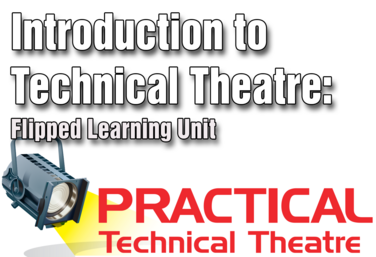
UNIT
Introduction to Technical Theatre: Flipped Learning
by Lindsay Price
When an audience watches a piece of theatre, they never see what goes on behind the scenes or know the people who work to make the production look its best. But theatre is a collaboration between what happens onstage and off.
This flipped learning unit will introduce students to the world of technical theatre. Through video, they will learn information on specific technical theatre roles and how they work together, types of stages, parts of a theatre and stage geography, and then apply this knowledge through in-class active-learning exercises.
For example, students will take on the role of a producer and decide how a budget will be divided among different departments. They will practice the calls a stage manager uses. The culminating assignment has students solve a common technical theatre issue: to design, create, and implement a solution for a unique stage direction in a play.
Read More
about Introduction to Technical Theatre: Flipped Learning
Read Less
about Introduction to Technical Theatre: Flipped Learning
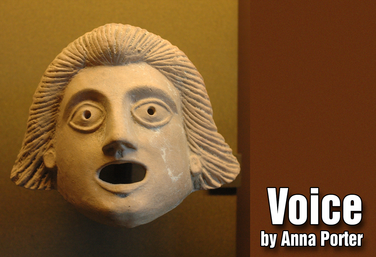
UNIT
Voice
by Anna Porter
In this unit, students will be introduced to a key element of performance: the voice. Students will explore how to thoughtfully communicate character, story, and emotion vocally. Students will begin by exploring articulation so that they understand the importance of clearly communicating their words onstage. They will further build on this with the following lesson on the different vocal varieties of pitch, tone, rate, and volume.
The final lesson helps students explore vocal characterization as well as the details and layers that can bring that character to life vocally. This unit study of the voice culminates in a final puppet show where students are asked to bring a story and character to life by using vocal variety, articulation, and characterization.
Read More
about Voice
Read Less
about Voice
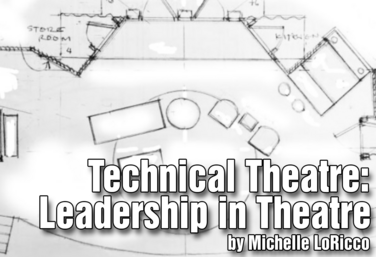
UNIT
Technical Theatre: Leadership in Theatre
by Michelle LoRicco
This Technical Theatre unit is designed to empower student leaders to analyze management roles in producing theatre while also using collaborative activities and reflection exercises to strengthen soft skills that every student should have. The unit covers the roles of producer, director, technical director, and stage manager, and ends in a culminating project.
Read More
about Technical Theatre: Leadership in Theatre
Read Less
about Technical Theatre: Leadership in Theatre
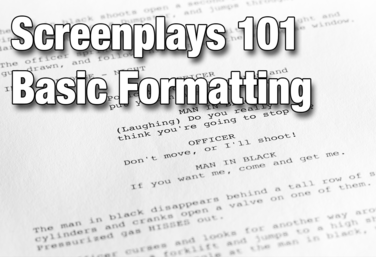
UNIT
Screenplays 101: Basic Formatting Unit
by Nicholas Pappas
Screenplays 101 is divided into two separate units: Basic Structure and Basic Formatting.
**It is highly recommended that you complete the Basic Structure unit before moving on to the Basic Formatting unit.**
Screenplays are used in every aspect of a film’s production. Depending on the size of the film, anywhere from a few dozen to a few thousand people use the screenplay to do their jobs. Because so many people need the screenplay to perform a job to the best of their abilities, a screenplay must be formatted immaculately.
Once completing this unit, students will have a basic understanding of how a screenplay is formatted and why it is formatted that way, all with an eye toward students developing their own screenplay.
Read More
about Screenplays 101: Basic Formatting Unit
Read Less
about Screenplays 101: Basic Formatting Unit

UNIT
Screenplays 101: Basic Structure Unit
by Nicholas Pappas
Screenplays 101 is divided into two separate units: Basic Structure and Basic Formatting.
**It is highly recommended that you complete the Basic Structure unit before moving on to the Basic Formatting unit.**
In this unit, we will focus on a basic history of screenplays, screenplay terminology, and the most common screenplay structure in film—the three-act structure. Theatre is important because it allows our young artists to be trained and learn about work ethic and discipline, and it creates community. But, we should also give our students opportunity and access to the cinematic arts. This is primarily a lecture-based unit with a lot of new information, with opportunities for students to apply knowledge including a final culminating project.
Read More
about Screenplays 101: Basic Structure Unit
Read Less
about Screenplays 101: Basic Structure Unit
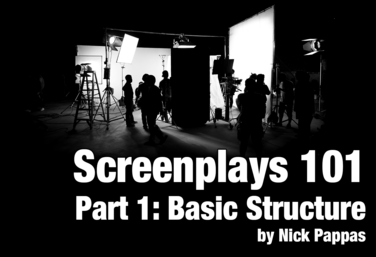
PD COURSE
Screenplays 101 - Part 1: Basic Structure
by Nicholas Pappas
Screenwriter Nick Pappas leads a two-part course on screenplays 101. Great scriptwriting is not something that can be covered in a single course: so we're going to start with the basics. Those basics are going to be split up into a Part 1 and a Part 2. Part 1, this course, will concentrate on basic film structure. Part 2 will concentrate on screenplay formatting.
By the end of this course, students should have a basic understanding of history, terminology, and are able to identify the barest bones of the three-act structure, all with an eye toward developing their own screenplay.
Read More
about Screenplays 101 - Part 1: Basic Structure
Read Less
about Screenplays 101 - Part 1: Basic Structure
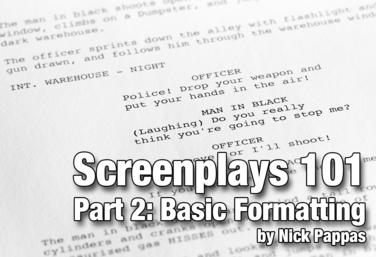
PD COURSE
Screenplays 101 - Part 2: Basic Formatting
by Nicholas Pappas
This course is a Part 2. In a Screenplays 101 course, screenwriter Nick Pappas covers both Structure and Formatting. Here in Part 2 we'll cover Basic Formatting. If you have not already watched Screenplays 101 – Part 1: Basic Structure, I highly recommend you go back and do so now. Having that knowledge under your belt will help you navigate Part 2 of this course.
The goal is that, by the end of this course, your students have a basic understanding of how a screenplay is formatted and why it is formatted that way, all with an eye toward developing their own screenplay.
Read More
about Screenplays 101 - Part 2: Basic Formatting
Read Less
about Screenplays 101 - Part 2: Basic Formatting
View all Standards for Florida Sunshine State Standards Standards Master List